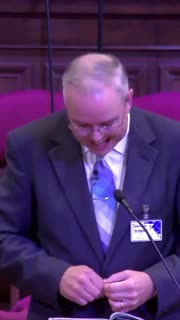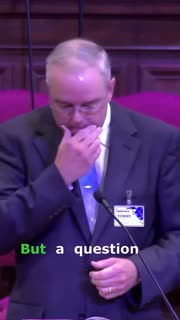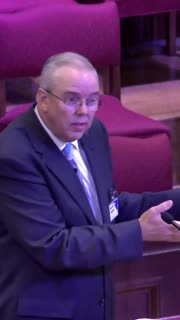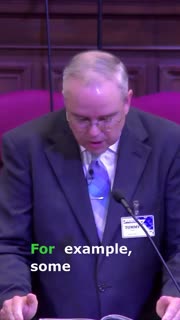Breaking the Cycle of Generational Sin Through Grace
Devotional
Sermon Summary
Bible Study Guide
Sermon Clips
### Quotes for Outreach
1. "We need his compassion. We need his mercy. We need his forgiveness. And it encourages us to know the children and the grandchildren. In a way, it offends our sense of justice because it says that we don't like to think God would let that happen. It doesn't seem fair to us, does it? Generations. But whether it looks fair to us or not, we certainly can't dispute that it's true, can we? Children often suffer for the sins of their parents." (82 seconds)
2. "But a question we should ask today is, can that curse be broken or is it inevitable? Are children destined to suffer for the sins of their fathers or can things be changed? Well, by God's grace, things can be different, both from a social and behavioral sense as well as a spiritual sense." (29 seconds)
3. "But in bringing this to a close, let me say that I know from my own family experience that the curse can be broken. God has done some amazing things in my life and my family that are almost beyond belief, at least from my perspective as I see it. I don't have the time to tell it all, but I should probably, myself, be, about the third or the fourth generation of some grievous Christ helped my father, helped him begin to move beyond the curse." (65 seconds)
4. "So the curse can be broken. It can be broken by God's grace. It can be broken by God's son who sent Jesus to break that curse for us. If you've been cursed by your forebears, know that you have a heavenly father who is compassionate and gracious, slow to anger and abounding in love and faithfulness as it says in verse 6. If your father cursed you, God can bless you. If your father rejected you, God will accept you." (65 seconds)
### Quotes for Members
1. "There's apparently a similar generational curse with regard to fathers and faith. Dr. Paul Vitts, a professor of psychology at NYU, wrote a book entitled Faith of the Fatherless, the Psychology of Atheism. And in the book he argues that atheists have a deep psychological need. He calls his theory the defective father hypothesis. He illustrates it by reviewing the lives of several noted atheists such as Friedrich Nietzsche, Bertrand Russell, the French philosopher Voltaire, Sigmund Freud, and that famous atheist herself, Madeline Murray O'Hare, who once tried to kill her father with a butcher knife." (29 seconds)
2. "For example, some years ago in USA Today there was an article on a man named Wes Moore or more precisely two men named Wes Moore. One of them wrote a book entitled The Other Wes Moore, One Name Two Fates. Tells the with single mothers. Both of them had run-ins with the police by the time they were 11 years old. Who wrote the book became a Phi Beta Kappa graduate of Johns Hopkins University and a Rhodes scholar. He went on to serve as a White House fellow under former Secretary of State Condoleezza Rice. He was an Afghanistan combat veteran. And last year he was sworn in as the first black mayor of the state of Maryland." (64 seconds)
3. "But the Other Wes Moore is in Jessup Correctional Institutes Maximum Security Unit, serving a life sentence without parole for his part in the shooting death of a Baltimore in their lives. The ways that they started out much the same. And in particular, he wanted to show what it's like to grow up without a father in the house. He said, my father or my mother could teach me to be a good person, but she couldn't teach me to be a good man. And so he credits family during the third and final visit that his father looked up at him from a drunken stupor and asked, who are you? The rest is tragic history." (64 seconds)
4. "That's why I said earlier that it isn't just your children and grandchildren that you're influencing. They aren't the only ones learning from you. You may be influencing the lives of other young people who observe how you live your life and you don't even. But in bringing this to a close, let me say that I know from my own family experience that the curse can be broken. God has done some amazing things in my life and my family that are almost beyond belief, at least from my perspective as I see it." (65 seconds)
5. "Through Jesus Christ, he can break the cycle of sin for you and turn you into the kind of person who blesses your children rather than curses them. And I pray, God, that in this place today, on this Father's Day, whether we're fathers or not." (65 seconds)
Ask a question about this sermon
1. "We need his compassion. We need his mercy. We need his forgiveness. And it encourages us to know the children and the grandchildren. In a way, it offends our sense of justice because it says that we don't like to think God would let that happen. It doesn't seem fair to us, does it? Generations. But whether it looks fair to us or not, we certainly can't dispute that it's true, can we? Children often suffer for the sins of their parents." (82 seconds)
2. "But a question we should ask today is, can that curse be broken or is it inevitable? Are children destined to suffer for the sins of their fathers or can things be changed? Well, by God's grace, things can be different, both from a social and behavioral sense as well as a spiritual sense." (29 seconds)
3. "But in bringing this to a close, let me say that I know from my own family experience that the curse can be broken. God has done some amazing things in my life and my family that are almost beyond belief, at least from my perspective as I see it. I don't have the time to tell it all, but I should probably, myself, be, about the third or the fourth generation of some grievous Christ helped my father, helped him begin to move beyond the curse." (65 seconds)
4. "So the curse can be broken. It can be broken by God's grace. It can be broken by God's son who sent Jesus to break that curse for us. If you've been cursed by your forebears, know that you have a heavenly father who is compassionate and gracious, slow to anger and abounding in love and faithfulness as it says in verse 6. If your father cursed you, God can bless you. If your father rejected you, God will accept you." (65 seconds)
### Quotes for Members
1. "There's apparently a similar generational curse with regard to fathers and faith. Dr. Paul Vitts, a professor of psychology at NYU, wrote a book entitled Faith of the Fatherless, the Psychology of Atheism. And in the book he argues that atheists have a deep psychological need. He calls his theory the defective father hypothesis. He illustrates it by reviewing the lives of several noted atheists such as Friedrich Nietzsche, Bertrand Russell, the French philosopher Voltaire, Sigmund Freud, and that famous atheist herself, Madeline Murray O'Hare, who once tried to kill her father with a butcher knife." (29 seconds)
2. "For example, some years ago in USA Today there was an article on a man named Wes Moore or more precisely two men named Wes Moore. One of them wrote a book entitled The Other Wes Moore, One Name Two Fates. Tells the with single mothers. Both of them had run-ins with the police by the time they were 11 years old. Who wrote the book became a Phi Beta Kappa graduate of Johns Hopkins University and a Rhodes scholar. He went on to serve as a White House fellow under former Secretary of State Condoleezza Rice. He was an Afghanistan combat veteran. And last year he was sworn in as the first black mayor of the state of Maryland." (64 seconds)
3. "But the Other Wes Moore is in Jessup Correctional Institutes Maximum Security Unit, serving a life sentence without parole for his part in the shooting death of a Baltimore in their lives. The ways that they started out much the same. And in particular, he wanted to show what it's like to grow up without a father in the house. He said, my father or my mother could teach me to be a good person, but she couldn't teach me to be a good man. And so he credits family during the third and final visit that his father looked up at him from a drunken stupor and asked, who are you? The rest is tragic history." (64 seconds)
4. "That's why I said earlier that it isn't just your children and grandchildren that you're influencing. They aren't the only ones learning from you. You may be influencing the lives of other young people who observe how you live your life and you don't even. But in bringing this to a close, let me say that I know from my own family experience that the curse can be broken. God has done some amazing things in my life and my family that are almost beyond belief, at least from my perspective as I see it." (65 seconds)
5. "Through Jesus Christ, he can break the cycle of sin for you and turn you into the kind of person who blesses your children rather than curses them. And I pray, God, that in this place today, on this Father's Day, whether we're fathers or not." (65 seconds)




